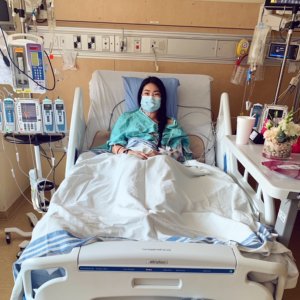“Donating a portion of my liver is that best thing that I have done. It’s only a few months of your life that could improve the quality of life of someone in urgent need of a liver transplant”
Ahead of National Organ and Tissue Donation Week (April 24 to 30, 2022), we spoke to Julia, a 24-year-old organ donor from Vancouver, British Columbia (BC), to learn more about what it takes to be a living liver donor.

CLF: Can you share a snapshot of you journey to becoming a living donor?
Julia: For a long time, I’ve felt compelled and drawn to give. I’ve always been interested in giving back. At 17, I joined the stem cell registry and at 18 I donated blood for the first time. Becoming a living donor is a relatively easy way to impact and improve someone else’s life. Late last summer, I donated the left-side of my liver anonymously to a baby in need.
CLF: Can you share insights into the organ donation process?
Julia: BC isn’t conducting live liver transplants right now, so I chose between Alberta – being close to BC – and Ontario – where I grew up. I ended up choosing Toronto as I am more familiar with the city, and I have family there. I applied to become a living donor in January 2021. Once I was accepted, I went through a screening process. I did bloodwork in Vancouver, and an MRI and CR scan in Toronto to determine the size of my liver. After that, I was matched up with a donor based on my blood type and liver size. The pandemic did delay the overall transplant journey, but I did benefit from most appointments being virtual.
CLF: What would you like your fellow Canadians to know about liver transplantation and becoming a living donor?
Julia: I want Canadians to know that being a living liver donor is an option and that your liver grows back after you donate. I did bloodwork and an MRI 3-months post-surgery and my liver had already completely regrown. The recovery process may be shorter than you think. Mine was quick; I was in hospital for five days, back in the gym after three weeks, and back to work as a nurse at eight weeks.
CLF: Do you have any final words to share?
Julia: I know so many people who have received a liver transplant and they are beyond grateful. Even if becoming a living donor isn’t the right fit for you, there are so many other ways to give back to the transplant community. You can sign your donor card, give blood, raise funds to support liver disease research, volunteer, and more.
At the time of this interview, Julia was about to become a living organ donor for the second time. This time, her kidney. She is now a double donor, having successfully donated her kidney anonymously. There are less than 10 anonymous double donors in Canada.
© 2025 Canadian Liver Foundation. All rights reserved. Charitable Registration # 10686 2949 RR0001.
Sign up for our newsletter and stay up to date on the latest news, updates and resources for liver disease.